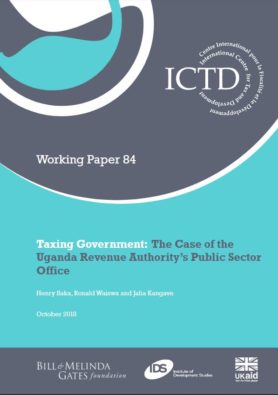ICTD Working Paper 84
Virtually all the literature on taxation presents it as a relationship between government and non-government taxpayers. And even though in practice government organisations are – or should be – big taxpayers, very few revenue authorities treat these organisations as a separate segment of taxpayers. Different categories of taxpayers behave differently and so need to be treated differently to best encourage their compliance. With this in mind, in 2014, the Uganda Revenue Authority (URA) established the Public Sector Office (PSO) as a separate office to manage the affairs of government ministries, departments and agencies. Subsequently, the duties of the office were expanded to include the management of the affairs of politically influential individuals. In this paper, we examine the reasons behind establishing the public sector as a separate taxpayer segment. We also look into the factors that have enabled the success of this office. We find that the PSO’s successful performance is facilitated by a number of factors including having a proficient team of revenue officials; having the support of top URA management; collaboration and coordination with other key government offices; support from high-ranking government officials; and the use of ‘soft compliance’ strategies such as organising taxpayer workshops, making phone calls to relevant contact persons in government organisations and sending emails with reminders of due dates for filing tax returns and paying taxes. Read the 2-page brief version here.
